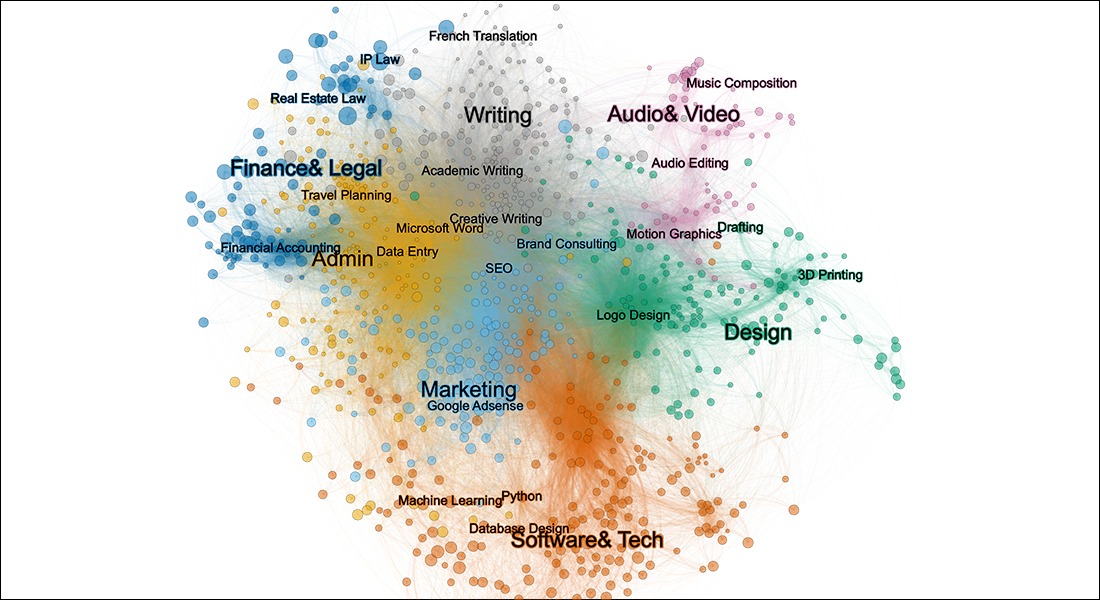Strong AI skills significantly raise salaries
Some professional competencies and skills are worth more than others. A new study maps the value of 962 specific skills and shows that knowledge of artificial intelligence (AI) is particularly popular today. On average, AI skills increase salaries by 21 per cent.

What kind of professional skills are particularly needed in a labour market characterised by technological breakthroughs? And how can individual employees acquire new skills that are in high demand and ultimately better paid?
These questions are at the centre of a new scientific study that has mapped and valued 962 work-related skills and their interrelationships.
AI competences are a good example of a type of skill that can be used in many work contexts, and which therefore adds extra value.
The study shows that there are significant differences in the value of specific professional skills. AI-related skills in particular are significantly better paid than most others. On average, acquiring specific AI skills increases remuneration by 21 per cent.
"The higher value of this type of work reflects the fact that artificial intelligence is developing rapidly and that competences in this area are in demand. But AI competences are also a good example of a type of skill that can be used in many work contexts, and which therefore adds extra value," says Ole Teutloff from the Copenhagen Centre for Social Data Science (SODAS) at the University of Copenhagen.
Together with Fabian Stephany from the University of Oxford, he is behind the study, which is published in the journal Research Policy.
In the study, the two researchers use data from 50,000 freelance jobs advertised on a large US online platform between 2014 and 2022. Since such freelance platforms, both indicate salary levels and specify requirements for qualifications and skills, data analyses make it possible to map the interrelationships and value of the various skills in detail.
This also applies to specialised AI skills: Here, skills related to 'machine learning' top the list with a relative extra value of 40%, followed by a range of other AI-related skills such as knowledge of 'deep learning' (27%), 'data analysis' (14%) and AI relevant programmes such as Python (8%) and Java (5%).
Figure: Examples of the added value of possessing selected AI competences
Study can guide the choice of continuing education
More generally, the study shows that the value of a skill or competency is significantly higher if it can be fruitfully combined with skills from other areas. In other words, it's a plus if you can add a completely different but sought-after skill to your professional toolbox.
For example, specific skills from the software and tech field are generally of high value to people working in marketing or law and finance. This is a case of what the researchers label complementarity. Conversely, 'photo retouching' is an example of a narrow skill that is harder to combine with other competences and therefore has less complementarity and value.
By recognising the value of complementarity, we can better guide workers on their individual reskilling journeys.
According to Fabian Stephany, mapping such relationships provides new insights into how individuals can best develop their skills to match labour market demand.
"Our findings have profound implications for individuals, businesses, and policymakers. By recognising the value of complementarity, we can better guide workers on their individual reskilling journeys," he says.
According to the researchers behind the study, it is important to note that the data is based on freelance assignments offered on an American online platform, which does not necessarily always reflect a European reality or the everyday life that permanent employees encounter at their workplace.
"Permanent employees will often work in teams and organisational hierarchies that also require a range of softer social skills," explains Ole Teutloff.
"But when it comes to AI skills, I would argue that they are hard skills, just as projects posted on freelance platforms can contain very complex tasks. Therefore, a project on machine learning doesn't have to be very different from a project in a company when we talk about skills. So also here in Europe, I think we can learn from the study."
About the study
The study entitled 'What is the price of a skill? The value of complementarity' is published in the scientific journal Research Policy.
Behind the study are Fabian Stephany, who is a research lecturer at the Oxford Internet Institute (OII) at the University of Oxford, and PhD student Ole Teutloff from the Copenhagen Centre for Social Data Science (SODAS) at the University of Copenhagen.
The study examines the value of 962 different work-related skills and their interrelationships. The data is based on approximately 50,000 jobs advertised between 2014 and 2022 on a large US online platform for freelance work. The specific platform is anonymised in the study.
See the full study at Research Policy: What is the price of a skill? The value of complementarity
Contact
Ole Teutloff
PhD fellow
Copenhagen Center for Social Data Science (SODAS)
Email: ole.teutloff@sodas.ku.dk
Mobile: +49 176 5050 2088
Søren Bang
Journalist
Faculty of Social Sciences
Email: sba@samf.ku.dk
Mobile: +45 29 21 09 73
